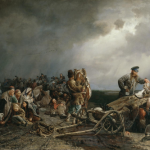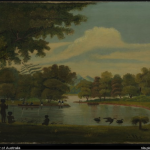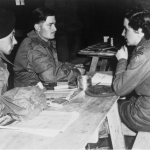
The forgotten success of penal transportation reform in late Imperial Russia: the lowering of prisoner mortality in the transfer system (1885-1915)
By Mikhail Nakonechny. The late Imperial Russian prison and exile system is almost unequivocally considered to be the traditional embodiment of brutality, institutional inhumanity and injustice. The popular image of endless convict suffering in vastness of Siberia, supported in the English speaking world by the influential George Kennan’s work on Siberian exile[i] and enhanced by […]

Protection for Whom? Aboriginal rights in the Swan River Colony
by Kellie Moss In June 1829, Governor James Stirling founded the Swan River Colony on the mainland of Western Australia. Whilst the hype surrounding the new colony attracted almost 2000 people to Swan River in the first year, few of these initial settlers concerned themselves with the rights of those they were dispossessing. Furthermore, […]

The closed prison and the memory of anywhere-but-here
The prison of the wolvenplein (Wolves Square), located in the city centre of Utrecht (The Netherlands), closed down in June 2014 as part of the budget cuts that have also affected the prison administration. By the time of the closure, 124 persons (men and women) were imprisoned there. The prison was built in 1856 as […]

Empire’s Exile: The Story of Lý Liễu
by Lorraine M. Paterson In 1923 in the British colony of Trinidad, a young English woman returned from visiting her family in a suburb of the capital, Port of Spain, to find that her Chinese husband of six years, Lý Liễu, had packed up his possessions and left her and their two small children. […]

Playing “Prison Architect” game
When my other half pointed out that there was a computer game where you could run your own prison, he probably didn’t think I would actually play it. After all, I spend enough of my free time (and his!) thinking and talking about convicts. Nevertheless, it struck me that a computer game might be a […]

Forced Labour and Shifting Borders
Some may argue (for good reason) that the collapse of space and time is a commonplace condition of twenty-first century life. From where I sit, however, I wonder: do many experiences symbolize the post-modern blurring of geographies and temporalities as deftly as air travel? I contemplate this admittedly non-unique yet nevertheless miraculous phenomenon—the inhabitation of […]

Life-Writing, Prisoners of War and the Carceral Archipelago
by Grace Huxford Lecturer in Nineteenth/Twentieth Century History, University of Bristol At the Carceral Archipelago conference held in September at the University of Leicester, I delivered a paper on British prisoners of war during the Korean, on a panel regarding ‘Political Prisoners’. Chaired by Professor Mary Gibson (CUNY), with Aaron Moore (Leicester) and Natasha Pairaudeau […]

Juvenile Immigrants: An Experiment in Convict Labour?
By Kellie Moss. During the last two years as an affiliated researcher with the Carceral Archipelago Project my work has taken some fascinating turns as the parameters I selected to define my research have unexpectedly expanded. Initially interested in the role of convicts transported to the Swan River Colony in Western Australia my efforts in […]

The Carceral Archipelago conference – an early career perspective
By Jennie Jeppesen. At the beginning of her discursive remarks, Ebony Jones summed up best one of the most refreshing things about the Carceral Archipelago conference which took place between the 13th and 16th of September in Leicester. She said (and I paraphrase slightly here) “It is refreshing to be in a place and with […]
Research, Space, and Distance
In June I attended a research seminar at which Professor Joanna Story, Principal Investigator of the Leverhulme Trust funded project, The Impact of Diasporas on the Making of Britain: Evidence, memories, inventions, and Professor Sarah Tarlow, Principal Investigator of Harnessing the Power of the Criminal Corpse project funded by the Wellcome Trust, spoke about […]

Recent Comments